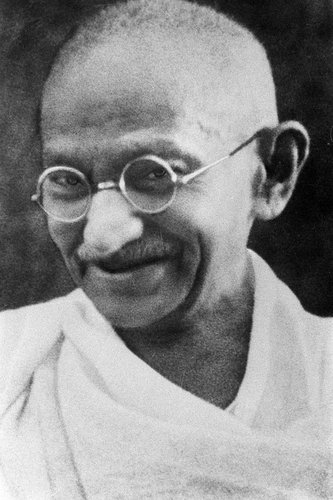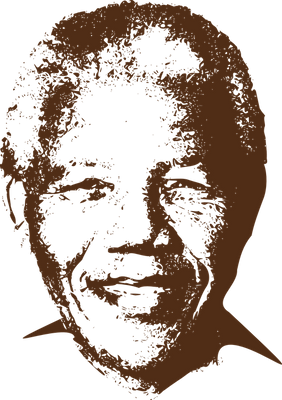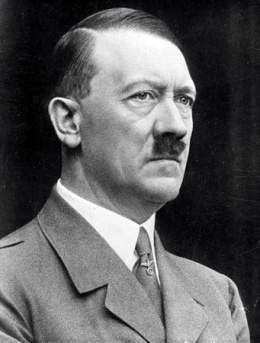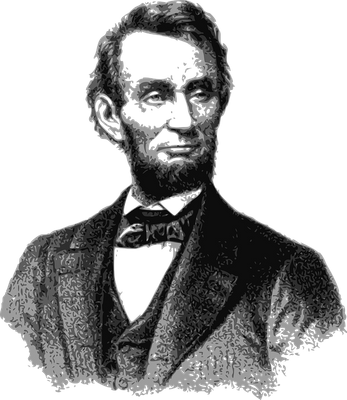ADSactly Leadership - Leaders and their footprint in the world. Part I

I would like to greet you again my esteemed Steemians, in the last delivery I spoke a little about leadership referring to the various styles that characterize it and how we could become leaders. In this opportunity I want to talk about great people in history considered as leaders for their way of influencing the great popular masses, for their presence, charisma, talent, skills and who have not only been recognized for their work in their countries of origin, but have also left their mark on the whole world. Here are five of them.

In no specific order, let us begin with the great Mohandas Karamchand Gandhi, better known as Mahatma Gandhi, undoubtedly considered an example of leadership, who never resorted to power or violence to achieve his goals. This historical figure and creator of the Indian Nationalist Movement tried to teach those who followed him the importance of sacrifice to go in search of freedom, even enduring pain and suffering if necessary. For him it was fundamental to believe in themselves, in personal precepts, in total fidelity to conscience and the struggle for ideals including reaching civil disobedience if necessary, it is said that his motivation and leading by example led him to be a great hero. According to his characteristics, an intuitive, inspiring and motivating character can be considered a transformative leader, a leadership oriented to create significant changes and transformations in people, strengthening objectives and facing risks. The British Empire in 1947 gave Independence to India turning Gandhi into a great hero, that impetus undoubtedly led him to become one of the most recognized leaders in the world.
Known by many as "The Leader Who Inspired the World," Nelson Mandela, South Africa's first black president, is part of this group of great world leaders who have left their mark in his wake. The merits of these characters are well known, because with his power of persuasion, conviction and service, he managed to put an end to centuries of humiliation and injustice and a system of racial segregation and confrontation between two sides, becoming a great feat worldwide. Mandela made it clear that division is not the method to achieve power, on the contrary, his position was to be stronger and achieve the goals. Undoubtedly his ability to face obstacles, difficult situations and many adversities make him an example of a leader. In addition to characteristics such as empathy, the ability to negotiate, forgive and motivate, along with his example of constancy, lead him to be part of this group of great world leaders.
"Real leaders must be ready to sacrifice all for the freedom of their people."
Nelson Mandela


Why is Adolf Hitler considered a leader? Generally one tends to think that leaders are those who have positive characteristics, however there are characters who marked the story and exerted a great influence on people but implementing strategies such as manipulation and a charisma that say dark, as some have called it. Adolf Hitler, the top leader of Nazi Germany and considered one of the most controversial leaders in history, was characterized by a great power of conviction from a very young age when he joined the German army, always seeking to have the support of those around him in his rigid ideas of dominating various situations. Undoubtedly his sure image, his charisma (or what some called idealized influence) infected his followers. It should be noted that this character ruled in a difficult economic situation, helping this to achieve empathy with the people and the imposition of their ideas that led to success. On the other hand his excellent oratory capacity, his audacity led him to achieve what he wanted, having a great connection with the great masses, his way of working was acute, he set the objectives to follow, maintaining total control of the processes, without delegating responsibilities to others. Undoubtedly, his leadership has the characteristics of being autocratic or what others call dictatorial leadership.
Steve Jobs, loved by some and hated by others, a great example of leadership, transformation, change and rebirth. There are many criticisms that have been made of this character, a tough, arrogant and conflictive personality that led him to have problems and differences with the one who initially founded his company Apple Computer and originated his departure in 1985, then he gives himself to his new company, NeXT Computer, obtaining modest profits. In his later return to Apple in 1997, his leadership style would have changed considerably reaching success and his work strategy, stimulating his team and motivating achievement was now his flag.
It is necessary to emphasize that Jobs had a talent without equal, his genius in the world of the computer science was fundamental in his success nevertheless to have developed attitudes and aptitudes of leader took him to the summit and to become one of the most influential and visionary men who have left mark in the world.
"Innovation distinguishes between a leader and a follower."
Steve Jobs


Abraham Lincoln is considered one of the most powerful men in the United States, who led the cause of the abolition of slavery in the country, humble and honest man, full of generosity towards his fellow men was the most relevant feature in him. He managed to lead a highly prepared team in his government cabinet to face the difficult situation that the country was living at that time, achieving a totally democratic government. His empathy was able to connect with many people, detecting the abilities and capabilities of those around him and in this way gain many followers. This emblematic president was also characterized by being a very good communicator, charismatic and with important skills to interact with his team. It is important to point out that some of those who were part of his cabinet were political rivals, however he placed his trust in them and recognized their merits. Lincoln is currently one of the three main presidents of the United States since 1940.
Undoubtedly these are just some of those great leaders who left their mark on this world, some questioned and debated for their actions, others praised for their nobility and their achievements, but all with impetus to fight for their ideals, to achieve their goals, to influence their followers who led them to the place they occupy today in history.
Authored by @luces
Consulted link
https://www.thefamouspeople.com/leaders.php
Click on the coin to join our Discord Chat

Witness proposal is here:
Go To Steem Witness Page
In the bottom of the page type: adsactly-witness and press vote.

Use small letters and no "@" sign. Or, click here to vote directly!
Thank you!
A good synthesis of the life of these important leaders of the 20th century, @luces. As you well point out, there are not only positive, democratic, benefactors; there are also negative, tyrannical, malefactors, even if we don't like it. And of these, unfortunately, the list is long; you named one; Hitler, but there are also Lenin, Stalin, Gaddafi... Of the former I would add, from the European sphere (although with international resonance, since they contributed mainly to the collapse of communist power) to Mikhail Gorbachev, Lech Walesa, Karol Wojtyla (John Paul II) and Vaclav Havel. It would be interesting to evaluate Latin American leaders. Thank you for your post. Greetings.
There is one characteristic that is fundamental in any leader and that is the sense of justice and the ability to negotiate, so sometimes it is difficult for me to think of autocratic or dictatorial people, people who do not know how to listen or follow, as leaders. But unfortunately, history is full of such leaders. In Venezuela, we are still suffering the misfortunes of having followed a leader like that. With this text I remember, on one occasion, a section of boys who had to present a paper for international competitions. I had been behind them, supporting them, reviewing them, but on the day of the formal presentation of the project, they wouldn't let me in. The boys saw me looking like orphans and I remember telling them: it's time to fly! Fly high. The presentation of the project was a success. The boys won the prize: to travel to Spain to present their project. I think that a leader does not have the vision that he is in front of the group, but in the middle, next to them. Let there be more leaders capable of seeing and valuing the role they must play in any society! Thank you for your post, @dulce and @adsactly for publishing it.
Interesting job, @lights. I consider that the condition to be a leader is innate, one is born with the impetus and the characteristics of who wants to lead a group, of who wants to go always to the head and develops a great capacity for the call, for the persuasion and for the conviction. As you mentioned in your publication, not all leaders seek the good or carry positive messages. You have referred to Hitler, as we know this man has been one of those who has done most harm to humanity, and yes, can be considered a leader, but guided by evil became a tyrant, an exterminator. This kind of leaders are not what we need in the world, on the contrary, should abound more men like Gandhi, Mandela who leave their mark of love, peace and solidarity multiplied. Thank you @luces for this good publication and @adsactly for spreading it.
Great job, enlightening and educating posts
With this post, we become familiar with influential figures from various parts of the world.
The example of the characters of Mahatma Gandhi, Hitler, Abraham Lincoln, Nelson Mandela, Steve Jobs, is a form of leadership that we can take on the good side. Indeed, of course each has something that is not liked, but as a form of reflection to us to always be on the right path.
Mahatma Gandhi fought for India's independence with Swadeshi, Satyagraha, Ahimsa, was able to revive the spirit of independence and fight for democracy. Nelson Mandela fought for equal rights for the people of South Africa who at that time applied Apartheit politics. Abraham Lincoln Steve Job and even Adolf Hitler championed his nation.
maybe if it was deemed a deficiency in Hitler with his Nazi, then we should see the other side that Hitler was able to arouse the spirit of nationalism, even though it eventually became excessive with ultransionalism and even Chauvinism.
And we remember that the leaders you present are a mirror for us to act. Take the good and leave the bad. It should be HISTORY MAKE MAN WISE
thank you @luces
Thank you @adsactly
Thank you steemit
Warm regard from Indonesia
You are saying a lot of good things with many leaders around the world. I did not see anyone like you write this way. It's very much like after. Good
The British Empire in 1947 gave Independence to India turning Gandhi into a great hero, that impetus undoubtedly led him to become one of the most recognized leaders in the world.
http://boardresult.e-monsite.com/pages/result/pec-5th-class-result-2019.html